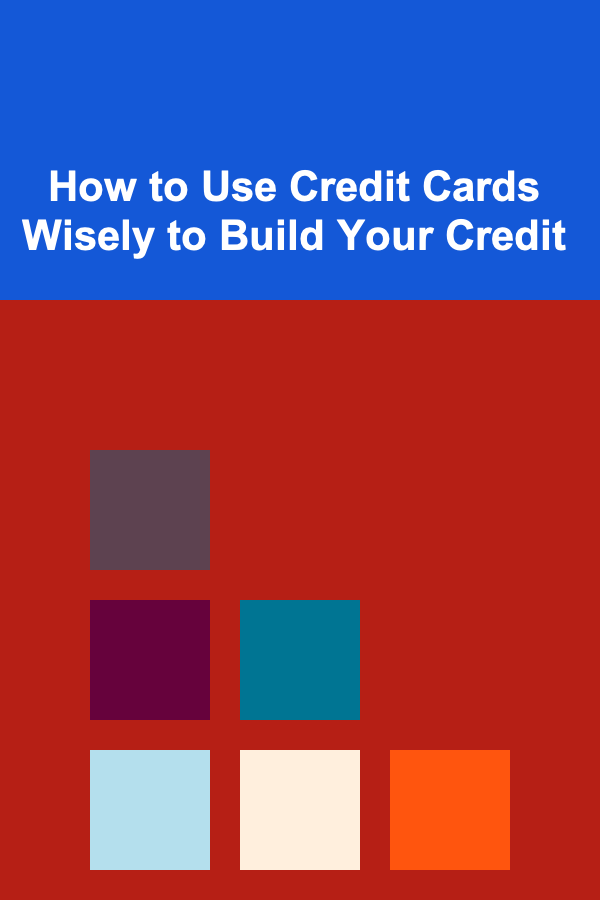
How to Use Credit Cards Wisely to Build Your Credit
ebook include PDF & Audio bundle (Micro Guide)
$12.99$5.99
Limited Time Offer! Order within the next:

Credit cards can be powerful tools for building your credit and managing your finances, but they must be used wisely. When used correctly, credit cards offer convenience, security, and numerous rewards. However, if mishandled, they can lead to debt, financial stress, and even a damaged credit score. In this article, we will explore how to use credit cards wisely to build your credit.
Understanding Credit Cards and Credit Scores
Before we dive into the specifics of using credit cards, it's important to understand what credit cards are and how they impact your credit score. A credit card is a financial product that allows you to borrow money up to a set limit for purchases, which you will repay later, either in full or over time. How you manage credit cards can significantly affect your credit score, a numerical representation of your creditworthiness.
Your credit score is influenced by several factors:
- Payment History (35%): Whether you make your payments on time.
- Credit Utilization (30%): The ratio of your credit card balances to credit limits.
- Length of Credit History (15%): The length of time you've had credit accounts.
- New Credit (10%): How often you apply for new credit.
- Credit Mix (10%): The variety of credit accounts you have, including credit cards, loans, and mortgages.
Why Credit Cards Matter for Building Credit
Credit cards contribute to building credit primarily by demonstrating how responsibly you can manage borrowed money. If you consistently pay your balance in full and on time, you are showing lenders that you are a trustworthy borrower, which can result in a higher credit score over time. A good credit score is important for securing favorable loan terms for major purchases, such as a home or car, and can even affect your job opportunities or insurance premiums.
Step-by-Step Guide to Using Credit Cards Wisely
1. Choose the Right Credit Card
Not all credit cards are created equal, and selecting the right card for your situation is an important first step in building your credit. Here are some considerations when choosing a credit card:
A. For Beginners: Secured Credit Cards
If you are just starting to build your credit, or if you have a poor credit history, a secured credit card may be the best option. With a secured credit card, you must make a deposit that acts as collateral. Your credit limit will typically be equal to the amount of your deposit. These cards allow you to make purchases and build your credit with responsible use. After a certain period, many secured credit cards will allow you to upgrade to an unsecured card.
B. Unsecured Credit Cards
If you already have a credit history and a reasonable credit score, you might qualify for an unsecured credit card. These cards don't require a deposit, and they often come with better benefits, such as rewards programs and higher credit limits.
C. Consider Rewards and Benefits
Many credit cards offer rewards programs, such as cashback, points, or travel miles. These rewards can be a great way to maximize the value of your purchases. However, it's essential not to get carried away with spending just to earn rewards, especially if you're carrying a balance that incurs interest. Make sure to select a card that aligns with your spending habits and financial goals.
2. Make Timely Payments
One of the most important aspects of using a credit card wisely is making timely payments. Your payment history accounts for 35% of your credit score, so missing payments or making late payments can significantly harm your credit score. Here's how to stay on track:
A. Set Up Reminders or Automatic Payments
Use reminders, whether digital (via your phone or email) or physical (sticky notes or calendars), to help you remember your due dates. Better yet, set up automatic payments for the minimum payment or, even better, for your full balance. This ensures that your payments are always on time.
B. Avoid Late Fees
Late payments not only hurt your credit score but can also incur late fees, which can add to your debt. By paying on time, you avoid these additional costs and ensure that your credit utilization ratio remains low.
3. Keep Your Credit Utilization Low
Credit utilization, which refers to the percentage of your credit limit that you use, is an essential factor in determining your credit score. Ideally, you want to keep your credit utilization under 30%. Here's why and how to manage it:
A. Why Credit Utilization Matters
Using a large portion of your available credit can signal to lenders that you are financially stretched and may be at a higher risk of default. Keeping your credit utilization low demonstrates to creditors that you can handle your available credit responsibly.
B. How to Manage Credit Utilization
To keep your credit utilization low:
- Avoid spending right up to your credit limit.
- Pay off your balance in full each month to prevent high utilization rates from accumulating.
- If necessary, request a credit limit increase. A higher limit means that even if you spend more, your utilization ratio may remain low.
4. Pay More Than the Minimum Payment
While it's crucial to make at least the minimum payment each month, it's best to pay off your full balance whenever possible. Here's why:
A. Avoiding Interest Charges
If you only make the minimum payment, the remainder of your balance will accrue interest. Credit card interest rates can be very high, often exceeding 20% or more, which can quickly add up and make it harder to pay off your debt.
B. Reducing Your Debt Faster
Paying more than the minimum reduces your debt more quickly, freeing up your available credit and reducing your credit utilization ratio.
5. Monitor Your Credit Regularly
It's important to keep track of your credit progress and ensure that you are staying on top of your financial responsibilities. Regularly monitoring your credit report helps you:
A. Check for Errors
Sometimes, your credit report may contain errors or inaccuracies that can negatively impact your credit score. By reviewing your credit report, you can dispute any inaccuracies and ensure that your credit is reported correctly.
B. Track Your Progress
Monitoring your credit score regularly allows you to track improvements and see how your credit card usage is affecting your score. There are many free tools and services available that allow you to check your score regularly without hurting your credit.
6. Avoid Opening Too Many New Accounts
Opening multiple new credit accounts in a short period can negatively impact your credit score. Here's why:
A. Hard Inquiries
Each time you apply for a new credit card, the issuer will perform a "hard inquiry" on your credit report. Too many hard inquiries in a short period can indicate that you are desperate for credit, which can reduce your credit score.
B. New Credit Mix
While having a variety of credit accounts (credit cards, loans, mortgages) is beneficial for your credit score, applying for too many new credit cards can make your credit profile look unstable. Instead of opening new accounts frequently, focus on managing the cards you already have.
7. Be Careful with Cash Advances
Credit card companies offer the ability to take out a cash advance, but this is generally not a good idea. Here's why:
A. High Fees and Interest Rates
Cash advances often come with higher interest rates than regular credit card purchases, and the interest starts accruing immediately (no grace period). This makes them an expensive option for borrowing money.
B. Impact on Your Credit
If you need cash urgently, try to find other solutions. Regular use of cash advances can negatively affect your credit score and increase your debt load.
8. Use Credit Cards for Emergencies, Not Lifestyle Inflation
Credit cards are designed to help manage short-term spending and emergencies, not as a way to fund a lifestyle that's beyond your means. Here's how to keep your credit card spending in check:
A. Stay Within Your Budget
Before making purchases on your credit card, ensure that they fit within your monthly budget. Consider using cash or debit for non-essential purchases to prevent accumulating debt.
B. Reserve Credit Cards for Emergencies
When unexpected expenses arise, such as medical bills, car repairs, or urgent home repairs, credit cards can be a helpful tool for managing those costs. However, avoid using them for routine expenses that can be paid with cash or a checking account.
9. Build Your Credit with Patience
Building good credit takes time. There's no quick fix, and credit scores don't improve overnight. However, by following the above strategies consistently, you will gradually build a strong credit history. Remember that:
- The longer your credit history, the more reliable you look to lenders.
- Consistent, on-time payments are key to demonstrating your financial responsibility.
- Responsible credit usage signals to creditors that you are capable of managing debt.
Conclusion
Using credit cards wisely is an important part of building and maintaining a good credit score. By selecting the right credit card, making timely payments, keeping credit utilization low, and avoiding common pitfalls like unnecessary debt and cash advances, you can set yourself up for success. Building credit takes time and effort, but with patience and discipline, you can use credit cards as a powerful tool to establish a solid financial foundation and improve your credit profile.
Reading More From Our Other Websites
- [Home Rental Property 101] How to Ensure Safety and Compliance for Your Apartments with a Pool
- [Organization Tip 101] How to Organize Your Digital Files for Easy Access
- [Home Family Activity 101] How to Start a Family Fitness Challenge for Motivation
- [Gardening 101] The Best Garden Watering Tips for Different Seasons
- [Weaving Tip 101] Cross‑Cultural Threads: Global Inspirations That Redefine Modern Weaving
- [Home Pet Care 101] How to Incorporate Pet Care Routines into Your Daily Life
- [Home Lighting 101] How to Set Up Smart Lighting Systems: A Beginner's Guide to Automated Home Illumination
- [Home Storage Solution 101] How to Organize Your Bathroom with Space-Saving Storage Hacks
- [Home Budget Decorating 101] How to Create a Relaxing Outdoor Space on a Budget
- [Organization Tip 101] How to Create a Cozy and Stylish Eclectic Home Decor

How to Create a Festive Atmosphere with Minimalist Holiday Decor
Read More
How to Educate Others About the Importance of Giving
Read More
How to Interpret Fibonacci Retracements for Crypto Trading
Read More
How to Prepare a Budget for Your Side Hustle
Read More
How to Set Up a Home Rental Property Checklist for New Tenants
Read More
Choosing the Right Face Oil for Your Skin Needs: A Comprehensive Guide
Read MoreOther Products

How to Create a Festive Atmosphere with Minimalist Holiday Decor
Read More
How to Educate Others About the Importance of Giving
Read More
How to Interpret Fibonacci Retracements for Crypto Trading
Read More
How to Prepare a Budget for Your Side Hustle
Read More
How to Set Up a Home Rental Property Checklist for New Tenants
Read More